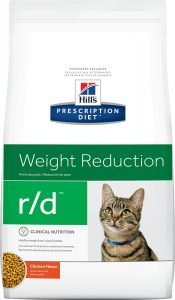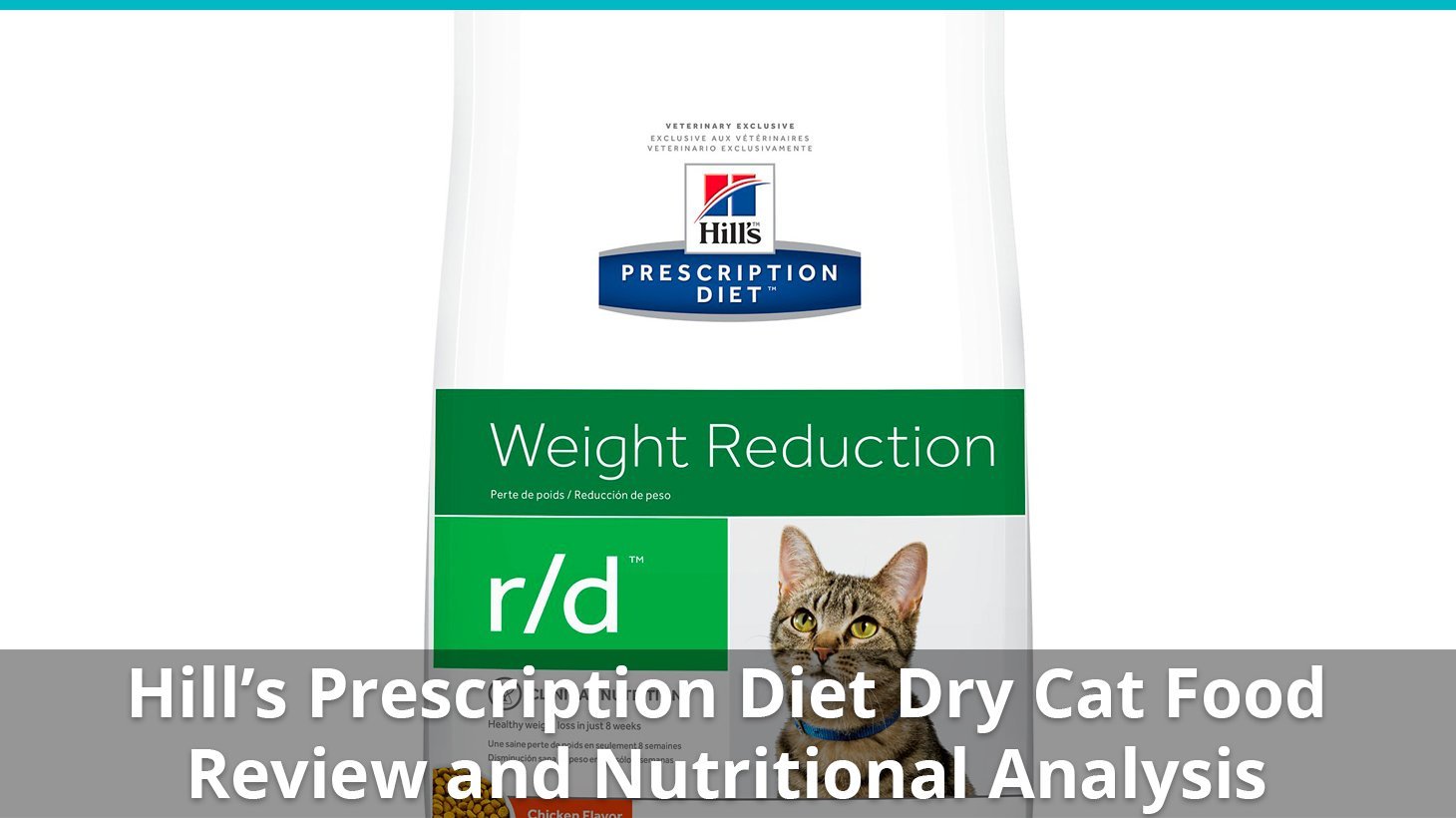Rating
- Meat is the first ingredient – 0.5 Star
- Uses some unnamed meats – 1 Star
- Above average protein content – 0 Star
- Less than 4 controversial ingredients – 0 Star
- Catological Discretionary Rating – 0 Star
2 things specific to this brand of foods before we get started.
- This is a prescription diet, which you can only buy with a prescription from a veterinarian. You can purchase prescription foods from Chewy.com, but will need to provide proof of prescription.
- The Hill’s Prescription Diet includes a huge variety of foods supposedly designed to help with very specific ailments. We will be combining them all into this review, because they are all quite similar, and sadly, they are all very low quality. You’ll learn more below.
Here’s a few important points:
- Meat is the first ingredient in about half of the recipes
- By-products and filler ingredients are used in abundance
- Protein is typically very low, and carbohydrates are typically very high
- Includes added vitamins and minerals
- While the recipes claim to be good for different ailments, in reality each recipe is low quality and full of biologically inappropriate ingredients
Hill’s Prescription Diet product line includes 22 dry recipes/flavors.
Each recipe below includes its related AAFCO nutrient profile when available on the product’s official webpage or packaging: Growth (G), Maintenance (M), All Life Stages (A), Supplemental (S) or Unspecified (U).
The star rating is a rough average of all of the flavors in a single line of food. If an individual recipe scored lower or higher, we will mark that below, next to the flavor.
- Hill’s Prescription Diet Urinary Care c/d Chicken (M)
- Hill’s Prescription Diet Urinary Care c/d Ocean Fish (M)
- Hill’s Prescription Diet Urinary Care c/d Stress Chicken (M)
- Hill’s Prescription Diet Urinary Care s/d Chicken (M)
- Hill’s Prescription Diet Kidney Care k/d Chicken (M)
- Hill’s Prescription Diet Kidney Care k/d Ocean Fish (M)
- Hill’s Prescription Diet Kidney Care k/d Early Support Chicken (M)
- Hill’s Prescription Diet k/d + Mobility Chicken (M)
- Hill’s Prescription Diet Digestive Care i/d Chicken (G, M)
- Hill’s Prescription Diet Skin/Food Sensitivities z/d Original (M)
- Hill’s Prescription Diet Metabolic + Urinary Chicken (M)
- Hill’s Prescription Diet Glucose/Weight Management m/d Chicken (M)
- Hill’s Prescription Diet Digestive/Weight Management w/d Chicken (M)
- Hill’s Prescription Diet Metabolic Chicken (M)
- Hill’s Prescription Diet Thyroid Care y/d Chicken (M)
- Hill’s Prescription Diet Dental Care t/d Chicken (M)
- Hill’s Prescription Diet Skin/Food Sensitivities d/d Venison & Green Pea (M)
- Hill’s Prescription Diet Metabolic + Urinary Stress Chicken (M)
- Hill’s Prescription Diet Skin/Food Sensitivities d/d Duck & Green Pea (M)
- Hill’s Prescription Diet Weight Reduction r/d Chicken (M)
- Hill’s Prescription Diet Aging Care g/d Chicken (M)
- Hill’s Prescription Diet Joint Care j/d Chicken (M)

Hill’s Prescription Diet Weight Reduction r/d Chicken was selected to represent the other products in the line for this review.
Hill’s Prescription Diet Weight Reduction r/d Chicken
Dry Cat Food
| Estimated Nutrient Content |
| Protein | Fat | Carbs | |
|---|---|---|---|
| Guaranteed Analysis | 31% | 7% | NA |
| Dry Matter Basis | 35% | 8% | 38% |
| Calorie Weighted Basis | 38% | 21% | 41% |
Estimated Dry Matter Nutrient Content
Fiber (guaranteed analysis)
1.6%
Calories/100g
302
Is real, named meat the first ingredient?
Yes
Ingredients
Brewers Rice, Chicken By-Product Meal, Corn Gluten Meal, Powdered Cellulose, Chicken Liver Flavor, Soybean Oil, Lactic Acid, Calcium Sulfate, Potassium Sulfate, Choline Chloride, DL-Methionine, Taurine, Glyceryl Monostearate, Potassium Chloride, vitamins (Vitamin E Supplement, L-Ascorbyl-2-Polyphosphate (source of Vitamin C), Niacin Supplement, Thiamine Mononitrate, Vitamin A Supplement, Calcium Pantothenate, Riboflavin Supplement, Biotin, Vitamin B12 Supplement, Pyridoxine Hydrochloride, Folic Acid, Vitamin D3 Supplement), Iodized Salt, L-Carnitine, L-Threonine, minerals (Ferrous Sulfate, Zinc Oxide, Copper Sulfate, Manganous Oxide, Calcium Iodate, Sodium Selenite), Mixed Tocopherols for freshness, Natural Flavors, Beta-Carotene
Ingredients in red are controversial or of questionable quality.
Ingredient Breakdown
The first ingredient in this cat food is brewers rice. Bad.
These are the small fragments of rice kernels that have been separated from the larger kernels of milled rice.
It is basically a waste product from breweries.
It’s a cheap, non-nutritive filler that can be rough on the intestines, and potentially lead to diabetes.
Rice may also decrease taurine digestion. Taurine is a vital amino acid that cats need to stay healthy, but that they can’t produce themselves. Decreased digestion can be dangerous to cats.
The second ingredient is chicken by-product meal. Bad.
Some people believe by-products are reasonable ingredients, since cats would eat the other parts of an animal in the wild.
This one is even named. “Chicken” is better than “animal by-product”.
However, the fact remains that these are the secondary parts produced in addition to the principal product, which is usually human-grade cuts like the breast, etc.
According to AAFCO, this is the “ground, rendered, clean parts of the carcass, such as necks, feet, undeveloped eggs, viscera, and whole carcasses, exclusive of feathers, except unavoidably so.”
A meal is a concentrated form of the product, where moisture is removed and what’s left is a high-protein ingredient.
Cats might eat stuff like this in the wild, but it’s not the most nutritious, high-quality meat product manufacturers can put in their food.
The third ingredient is corn gluten meal. Bad.
Corn is not biologically appropriate, and most if not all corn ingredients are cheap fillers.
Corn gluten meal is used as a protein additive, but it is not as digestible as meat protein, and not what your cat needs to be healthy.
AAFCO says that it is “the dried residue from corn after the removal of the larger part of the starch and germ, and the separation of the bran by the process employed in the wet milling manufacture of corn starch or syrup, or by enzymatic treatment of the endosperm.”
Low quality ingredient.
The fourth ingredient is powdered cellulose. Bad.
This is a filler high in insoluble fiber.
It’s typically wood pulp (sawdust) from pine trees.
Too much insoluble fiber can interfere with digestion and inhibit protein and nutrient uptake.
After chicken liver flavor, the fifth ingredient is soybean oil. Bad.
Soy is a bad ingredient for cats, particularly soy manufactured in factories in the US, where soy bean protein is used to create other products, compared to Asia, where soy is typically fermented, which makes it much better for the body.
Soy contains many anti-nutrients that inhibits your cat’s body from digesting nutrients from the other foods she eats.
This recipe includes a number of other ingredients, but once you get down this far, none of them will be in large enough quantities to make a real difference, except for the added vitamins and minerals.
However, there are still a few things you should know.
Glyceryl monostearate is an emulsifier. It may contain potentially harmful chemical like BHA and BHT.
BHA and BHT have been shown to be potentially damaging to both humans and animals. The negatives include everything from being a carcinogen to interrupting hormone function.
To read a more in depth article about any of the ingredients listed here, check out our Cat Food Ingredient Wiki (currently under development).
The Catological Verdict on Hill’s Prescription Diet Dry Cat Food
From top to bottom, this is a below average dry food.
Meat is the first ingredient in only half the recipes, and many of the meats used are by-products.
Fillers are used extensively in every recipe, which increases carbohydrate levels. Each filler is also biologically inappropriate for a natural feline diet.
Just because these are prescription-only foods does not mean they are good.
It is worrying that any veterinarian would recommend these, when most of the issues they claim to solve can be solved with a natural diet that comes close to reaching the macro and micronutrient levels that cats would eat in the wild.
Don’t be fooled into thinking that these are high quality, or special in any way. They do not contain special, medicinal ingredients. They are low quality and are likely to do more harm than good to your cat.
Protein is too low, fats are typically too low, and carbohydrates are far too high.
This is NOT a good example of a dry food you should be feeding your cat.
Since it’s clear that plant products make up too much of this food (including being the first ingredient in many recipes), we can assume that this is a mostly plant-based food, which is not ideal for your carnivorous feline’s dietary needs.
To review, on a dry matter basis, this food is 35% protein, 8% fat, and 38% carbs.
As a group, the brand has an average protein content of 34%, and average fat content of 16%, and an average carb content of 42%.
Compared to the other 2000+ foods in our database, this food has:
- Below average protein.
- Average fat.
- Above average carbs.
Because meat is only the first ingredient in some recipes, it is full of fillers, and we don’t believe it’s fair for a company to charge so much for a low quality food, all while calling it prescription, as though it’s special, our rating for this brand is 1.5 stars.
Not recommended.
Hill’s Cat Food Recall History
We do not believe that a recall indicates a low quality food or company, and we respect the fact that sometimes things happen that cause a manufacturer to recall a food.
Usually these things are non-life-threatening, and we think it’s important to take a moment to be thankful about just how few recalls there really are in the industry, considering the enormous volume of food produced.
However, we do believe that a history of recalls may point to a larger issue with a company, and that discerning consumers want to know who they’re buying from, especially when it comes to something as important as the food you feed your beloved cat.
Here is a list of recalls that have affected the Hill’s brand in the past:
- May 2016 – High iron levels – UK and Russian products affected
- November 2015 (“Withdrawal”, not Recall) – Labeling issues – Multiple dog recipes affected
- June 2014 – Possible salmonella – 1 recipe affected
- April 2007 – Melamine – 1 recipe affected
- March 2007 – Melamine – Multiple cat food recipes affected
If you want to stay up to date on the latest recall information affecting your cat’s food, sign up to our email list and receive an email every time a recall is announced. We’ll also let you know about any updated ratings, recipe changes, or new cat foods on the market. (Our alert system will be launched shortly, check back soon.)
Where To Buy Hill’s Prescription Diet Dry Cat Food
We recommend purchasing your pet products from Chewy.com. They continually prove that they walk the walk while talking the talk, and I’ve never dealt with a more dedicated pet-parent base of people than those who work at Chewy.
Plus, they offer 20% off and free shipping on lots of orders.
Not Convinced?
Check out our ratings and reviews of the best cat foods in our comprehensive, data-backed guide right here.

